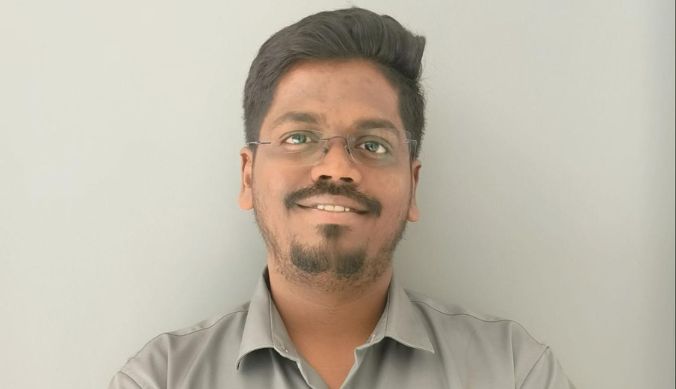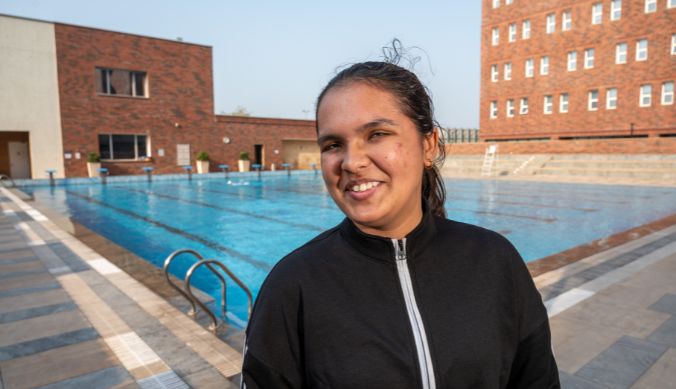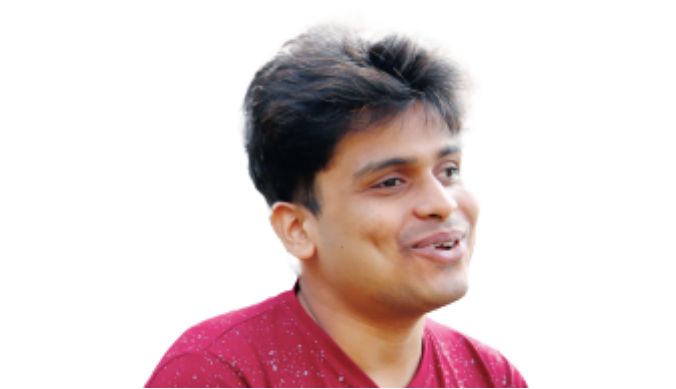The Project Amara: Ashoka student’s social impact initiative – Safe Period, Safe Environment
The Project Amara was founded with the aim to provide alternate solutions to menstrual hygiene and also safeguard the environment.
“Every year in India, approximately 432 million sanitary napkins are disposed of by 13% of the menstruating population. On the other hand, innumerable menstruating women and girls who cannot afford this, resort to using ash, leaves, used gauge and cotton, paper, wood, and even dirty cloth”, says Anjali Dalmia, co-founder of The Project Amara – an alternate solution to menstrual hygiene.
Anjali has been fighting to help women transition to more sustainable products for a very long time. It’s amazing to see how well-versed and passionate she is about the cause. Four years ago when she was still in High School, with four of her friends (Surabhee Arjunwadkar, Sayuri Deokar, Aahana Mehta, and Reva Patwardhan), she started The Project Amara, at DriveChange Learning and Resource Centre (DLRC) in Pune, with the sole purpose of addressing the environmental hazards caused by sanitary napkins and at the same time alleviating taboos surrounding menstruation.
“Information and education are a big part of this process. Sanitary napkins are subsidised for menstruating women and girls, but at the end of the day, it traps them in a toxic cycle promoting hazardous products which poison the earth and their bodies,” Anjali adds. The Project Amara has been raising awareness about healthier and more sustainable menstrual products such as menstrual cups, cloth pads, and biodegradable pads. Anjali goes on, “Till date, we have conducted numerous sessions in villages, slums, offices, schools and universities like Indian Institute of Science Education and Research (IISER) Pune, DoorStepSchool, Deep Griha, Ruby Hall Hospital and many more.”
Anjali has been a nature lover, from a very young age. Her parents run a sustainable, alternate learning centreon a mango farm. She grew up in several places and groomed herself in different schooling systems in Delhi, Singapore, Bali and Pune. Anjali says, “Growing up in that environment gave me so much perspective. It not just allowed me to learn about people and places but helped to value them. My time at Green School in Bali was the first time I was that close to nature. Both, my house and my school were made completely out of bamboo without any walls or windows. I spent my time climbing coconut trees and planting rice; watching spiders weave intricate webs and cleaning-up beaches and river banks.
Living in Bali, I realised that we are all an integral part of this vast and beautiful ecosystem.” She appreciates little things in life. “And what more can one ask for if one is close to the Mother Nature? It humbled me and helped me be level-headed”, continues Anjali. With a thinking prowess like this, she is inspiring!
Why menstrual hygiene one might ask? Anjali calmly questions back, “If not menstrual hygiene, then what?”
The Project Amara addresses the United Nation’s Sustainable Development Goal (SDG) 12 – ‘Responsible Consumption and Production’. Anjali continues, “This goal looks at resource and energy efficiency, sustainable infrastructure, and access to basic services and a better quality of life for all. It explores the idea of doing more with less.” Through its work of promoting sustainable menstrual products, teaching people how to create their own cloth pads, implementing changes at an administrative level to remove sanitary waste, holding global sessions, and making information available in several languages, The Project Amara directly addresses goals 12.4 (responsible management of chemicals and waste), 12.5 (substantially reduce waste generation), 12.7 (promote sustainable public procurement practices), and 12.8 (promote universal understanding of sustainable lifestyles). It also addresses SDG 5 (gender equality), making women more independent and self-sustaining.
The Project Amara holds small, personalised sessions with 20-60 women at a time to ensure the topic can be spoken about in an intimate manner to create the most impact. Their sessions are conducted in several local languages depending on the audience. Sessions are usually an hour long and are held with all demographics, genders, and ages. Anjali says,
“Our goal is not to preach to the participants, but to learn and grow together. It is always a two-way conversation and we listen as much as we teach. It is important to listen and understand first, before anything else. We try to help the menstruating women and girls become as self-reliable as possible, whether that is by teaching them how to make their own cloth pads, or through the use of the menstrual cup.”
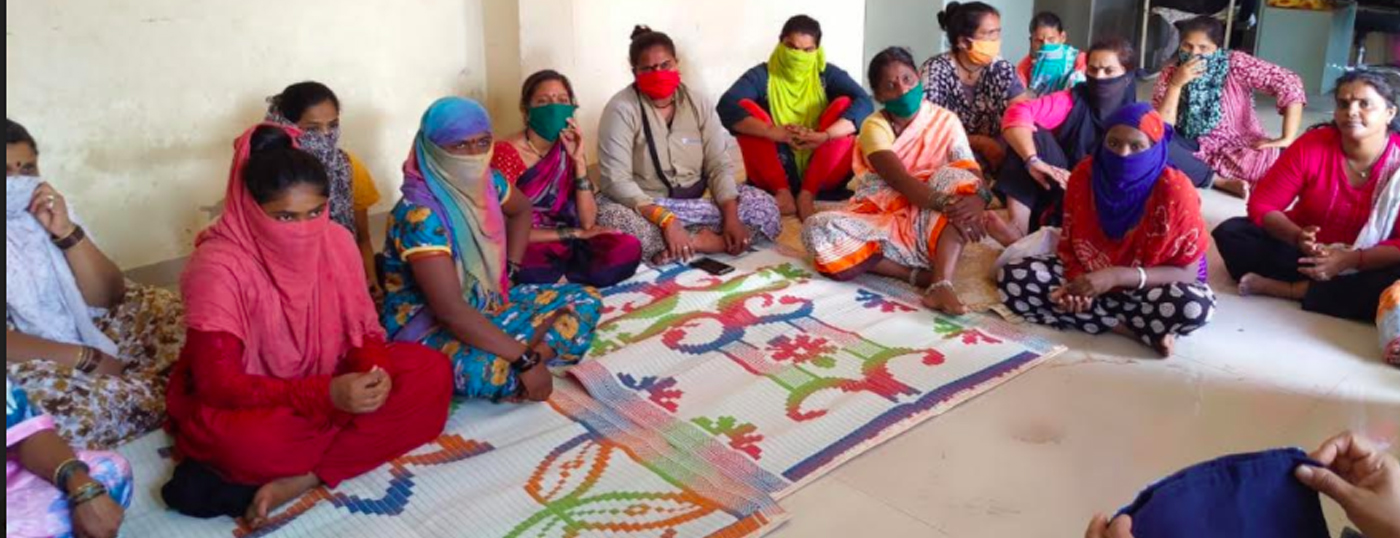
Pad distribution in Kothrud, Pune
Now on a more serious question, I ask her how she manages the funding of the project. She says, “The bulk of our funding, especially for product donations, comes from crowd-source funding. We are currently in the process of registering the initiative and plan to partly fund this project through Corporate Social Responsibility (CSR) funds in the future. We also earn part of our money through commission from selling products in our sessions. However, it is important to note that we are brand agnostic, and only sell/promote a brand based on our research and usage experience.”
And not just this, she is also a full-time undergraduate student. “When I am at Ashoka, I manage this project through weekly Zoom meetings with my co-founders and teammates. Those who are at Ashoka, we meet physically. I set aside 5 hours a week (around 1 hour a day) to work on The Project Amara’s outreach (I mainly head the Outreach and Marketing, as well as conduct sessions and develop new session content) and an additional 2 hours to conduct sessions. On campus, I have conducted sessions with the student body multiple times, and once with the housekeeping staff.”
This interviewer is in awe of her dedication and passion! Currently, they are holding Zoom sessions to reach as many people as possible despite the pandemic. Anjali continues, “With our incinerator overflowing from masks and disposable safely gear, reducing the amount of sanitary napkin waste is crucial.”
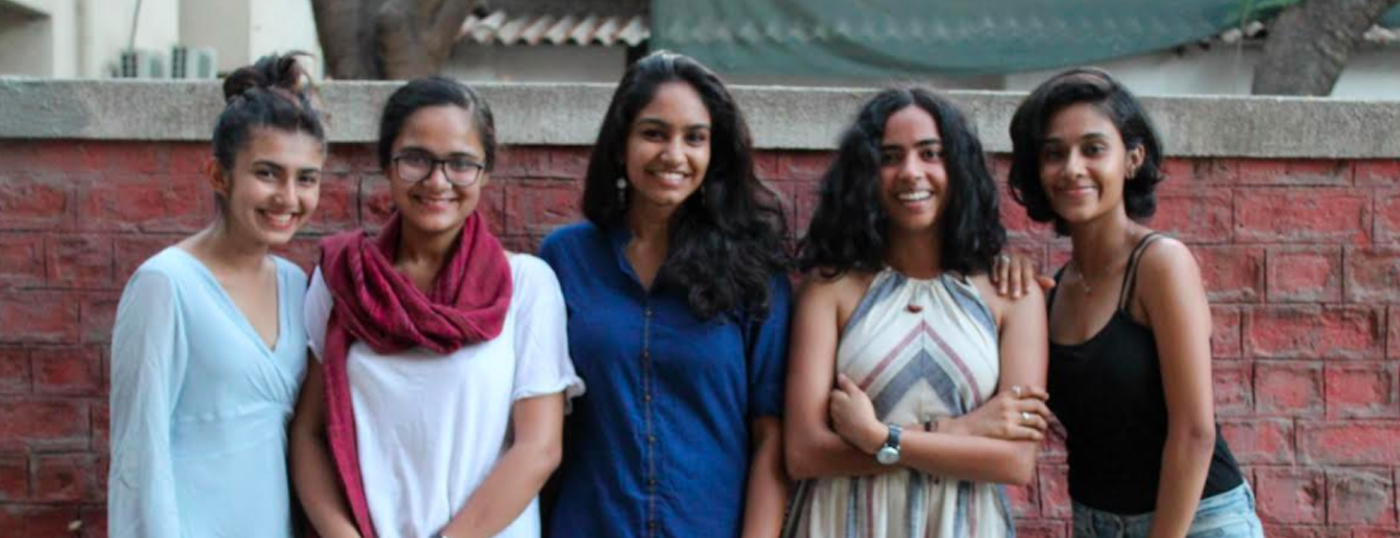
The Project Amara founders are all smiles for the camera!
I ask if she has had any help from her friends and peers at Ashoka and she is all praise for Ashoka and her friends here. She says, “Besides the co-founders, sixty per cent of the Amara team is composed of Ashoka students. They help us conduct sessions and even during this COVID-19 period when we have online sessions, they join us to conduct sections.
The Ashoka community has also been a great help in translating our sustainable menstrual product booklet in more than 10 regional languages. They have covered languages from Assamese to Telugu to Punjabi. And lastly, the campus organisation Ruhi helped us organise the session with the housekeeping staff on campus, and Aishwarya (a third-year student who runs ‘Ordinaire’) helped us organise the session in Asawarpur village.”
During the COVID crisis, The Project Amara had done incredible work. They are going to various urban slums in the city of Pune, and distributing free cloth pads and menstrual cups to the women. They are primarily reaching out to SWaCH workers who continue to collect garbage even during the lockdown. The women are also given a helpline number to call in case of emergencies/confusions and pamphlets written in Hindi and Marathi (including images to accommodate those who cannot read) to explain how to use the products to their neighbours. We go for these cloth pad distribution drives nearly twice a week. “The drives are being funded through donations from friends and family, who helped us raise more than 1.2 Lakh Rupees within a span of 4 days”, says Anjali.
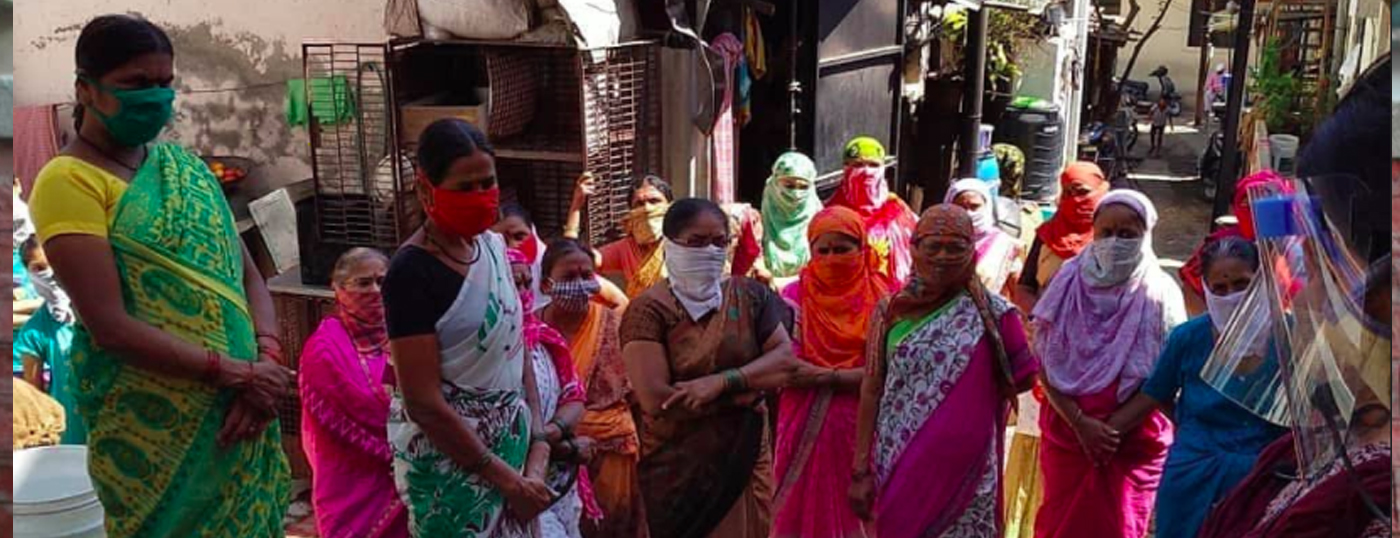
Pad distribution during COVID-19 in Karve Nagar, Pune
Anjali says, “While the families are already low in income and although they are receiving free sanitary pads right now, this supply will eventually be stopped and the women will need to continue buying them on their own, becoming a huge financial burden upon them. Reusable products will also ensure that the sanitary napkins are not becoming a health hazard for the community living in close quarters in labour camps. Without a garbage disposal system in these camps, wherever the synthetic sanitary napkins are being freely handed, they are clogging drains, creating hazardous waste, and posing a serious health risk to the entire community. And most importantly, this initiative will help all women gain access to dignified ways of managing their menstrual cycles.
In the past, our initiative has reached over 2,000 women.” The Project Amara aims to grow as a movement across India as well as wants to have an international presence. They want to create a culture that is period-positive and make sustainable menstrual products equally accessible to everyone.
“Our goal is to bring about period parity in India and make it 100% sustainable and equitable in the long term”, mentions Anjali.
The Project Amara has been featured in Hindustan Times, Indian Express, and Pune Mirror among many more. Anjali is extremely passionate about ecology and environmental issues and hopes to work majorly on these in the future, both nationally and internationally. She also dreams to open a university focusing on society and environment in India. She ends the interview by sharing an anecdote. “It was during one of the sessions we were conducting in Asawarpur village that I had the humblest of experience. It was a gathering at a local temple when women who participated finally understood that period was natural and not dirty.
Breaking taboos one woman at a time has been exhilarating for us! These women form a close community and they loved the idea of making their own cloth pads and were even curious about the menstrual cup! This resonates strongly with the belief of The Project Amara, that sustainability is not a privileged concept, and that sustainable menstrual products are for everyone.” Anjali Dalmia is a second-year Sociology major at Ashoka University who is providing alternate solutions to menstrual hygiene through The Project Amara.









